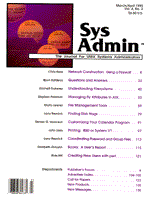
Sidebar: SANS Tutorials
Monday, April 24: 9:00 AM to 5:00 PM Topics in Network Administration Evi Nemeth (Univ. of Colorado) and Trent Hein (XOR Network Engineering) This course provides guidance on solving very common network management problems that confront system administrators. It includes advice on when and how to use some of the public domain software that is included with the course instructors' new UNIX System Administration Handbook. UNIX Security: Threats and Solutions Matt Bishop (Univ. of California at Davis) This course will discuss some threats to UNIX security and how to deal with them. The format of the class will be to analyze case histories in depth, to show what attacks the attackers exploited, how the systems administrators might have closed those loopholes, and how the intruders were discovered. Concepts and mechanisms will be discussed, as well as publicly available tools. This day is divided into four sections each of which focuses on non-network problems. Sendmail Configuration and DNS Management Rob Kolstad (BSDI) and Tina Darmohray (Great Circle Associates) This course presents an introduction to the DNS system, history and motivation, configuration and management. It will also look at how to modify, program, and debug sendmail configuration files. Tuesday, April 25: 9:00 AM to 5:00 PM Topics in System Administration Evi Nemeth (Univ. of Colorado) and Trent Hein (XOR Network Engineering) This course provides a survey of some key areas that are of concern to many system administrators: Survey of Dial-Up Networking, USENET News in the 90s, Security Tools, Introduction to Sendmail8, and Policy and Politics. Surfing 2000 Part I: Catching The Wave, An Introduction to The Internet Amy Kreiling (Univ. of North Carolina) with John Stewart (Cisco) If you already have a home page, but want or need to know more, this two-day course is just what you need. And, if you don't know what is meant by a home page, then this is the place, too. UNIX Security Course 2: Threats and Solutions from the Network and Security Challenges in Programs Matt Bishop (Univ. of California at Davis) This course analyzes incidents in which attackers have tried to gain illicit access to UNIX systems. We discuss the attacks used, why the exploited holes existed, how the system administrators responded, and how they closed the holes. Managing, Hiring, Ethics, and Policy for System Administrators Rob Kolstad (BSDI) and Tina Darmohray (Great Circle Associates) This course starts with tips and techniques for effective management and hiring of system administrators and effective management of your own time, then moves on to explore ethical and policy questions that shape the work environment for system administrators. Wednesday, April 26: 8:30 AM to 3:45 PM Practical Perl Tom Christiansen Perl is an excellent programming tool for many challenges, including system management tasks. It has become the programming language of choice for many system administrators because of its interpretive nature and incredibly rich feature set. Perl is a publicly available and highly portable interpreted programming language, with syntax and features that resemble C combined with the best parts of sh, sed, awk, and several other powerful UNIX tools. Surfing 2000 Part II: Building A Successful World-Wide Web Amy Kreiling (Univ. of North Carolina) with John Stewart (Cisco) The first day (Tuesday) helped you learn about all of the important current Internet Discovery and Retrieval Tools. In this second day, you'll get an inside look at the World Wide Web, its browsers and servers. UNIX Security Course 3: UNIX Security Tools and Internal Security Dr. Matt Bishop (Univ. of California at Davis) and Rob Kolstad (BSDI) The goal of this course is to assist UNIX security administrators, and interested users, in locating and using publicly available programs to improve the security of their systems. The class will compare the uses and drawbacks of several different programs, with an emphasis on when to use which. Constructing Firewalls for Network Security Tina Darmohray (Great Circle Associates) Often, the success of an enterprise depends heavily on digital communications. Until now, the techniques and tools required to secure a functional TCP/IP network have been an art -- acquired only through trial and error. This course presents issues and solutions surrounding the securing of functional internetwork connections and construction of an Internet Firewall. Saturday, April 29: 9:00 AM to 4:00 PM Four Keys to Professional Advancement: Managing Users; Managing Your Boss; Effective Technical Presentations; Effective Writing Bill Howell, Rob Kolstad, Alan Paller, and Carolyn Sherman Now, more than ever, raises and promotions go to the people who are good communicators as well as good technicians. If you are interested in improving your communications skills, this four-part course gives you tips and techniques that can help. The Most Useful Tools For System Administrators: Where to Find Them, How to Use Them Bjorn Satdeva (/sys/admin, inc.) This course is aimed at UNIX system administrators, and will teach a number of different publicly available tools which will be useful in their daily work. UNIX System and Network Performance Tuning Marcus Ranum, Trusted Information Systems This class is an introduction to the arcane art of performance tuning and benchmarking. Since system tuning is UNIX version specific, the class will focus on providing a strong grounding in what factors influence performance, and how to identify bottlenecks in various parts of the system.
|